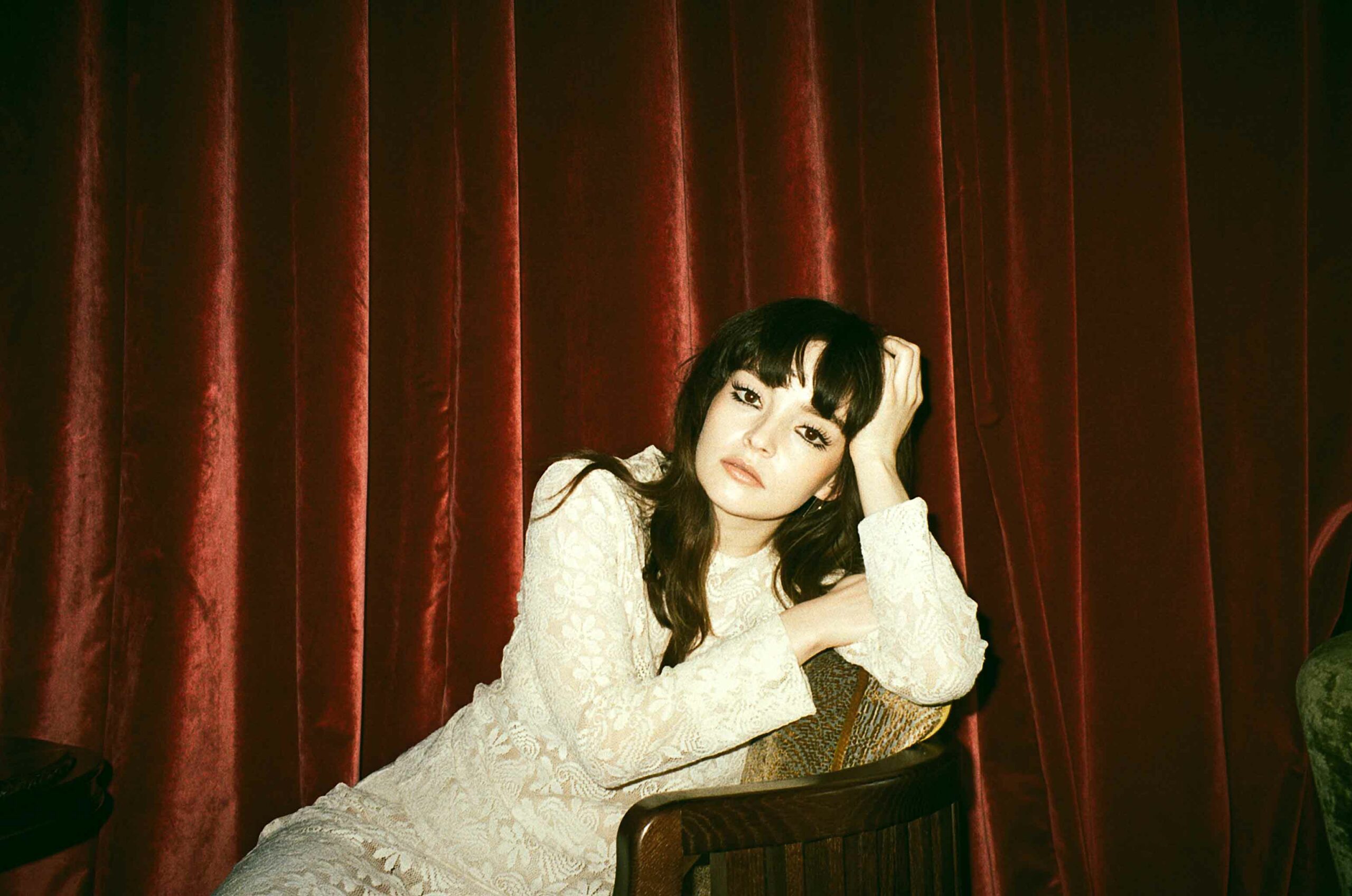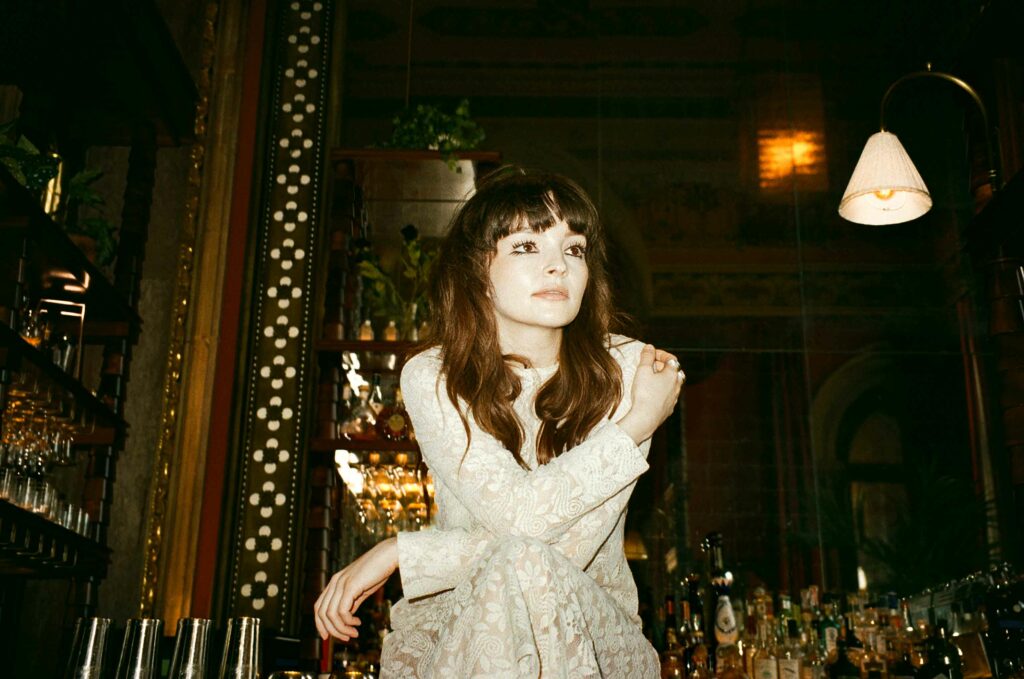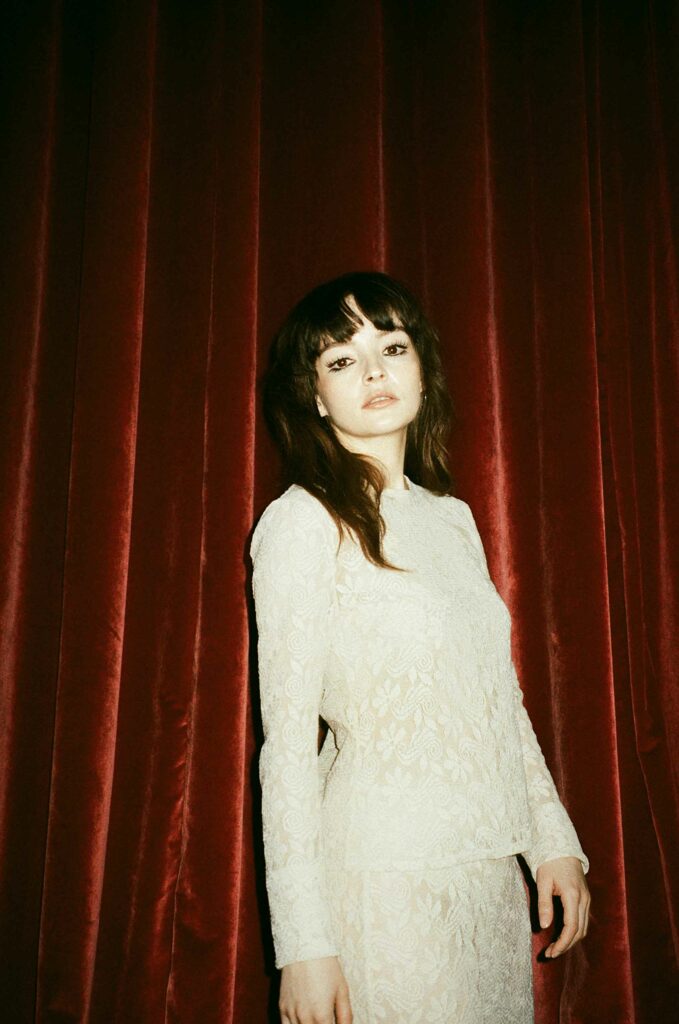Lauren Mayberry is finally putting herself first
Self-confessed people pleaser and CHVRCHES singer Lauren Mayberry is entering a bold new solo era

In some ways, it always seems inevitable when the singer of a successful band goes solo, like it was a predetermined endpoint all along. It never quite felt like the case for CHVRCHES vocalist Lauren Mayberry, though, so strong was the tie between her voice and the pummelling racket of synths cooked up by bandmates Martin Doherty and Iain Cook across four rapturously received albums over the past decade.
It felt all the more surprising, then, when Mayberry emerged under her own name late last year with the gorgeously sparse piano number ‘Are You Awake?’, kicking off a solo era that is seeing her loosen the shackles she’s operated under for the past 12 years with her band.
CHVRCHES released third album Love is Dead in mid-2018, which Mayberry now calls “the most creatively and interpersonally confused time” the band had ever gone through. It was then that she moved her life across the Atlantic to Los Angeles. “In the back of my mind, I thought, ‘If this ends, what will I do for a job?’” she tells Rolling Stone UK from a north London café. “Some people think that the frontperson of a band is the most easily transferred member into another space, but I don’t really feel like that. I think the people that are the main producers in the band could get jobs tomorrow producing and writing for other people in a way that I just can’t. I moved to LA to decide whether I wanted to make a solo record and see what that would look like.”
Though the move went through, it coincided with the pandemic and led CHVRCHES to make transatlantic fourth album Screen Violence. Mayberry describes the 2021 album as an unexpected but overdue “marriage therapy” that “we required to appreciate what we were doing”, admitting that “it felt comforting to us to make a record together” after working through their issues. However, ideas of going solo lingered in the back of her mind, and an itch to create something outside of the ecosystem that had housed her for the previous decade did not disappear.
CHVRCHES formed in Glasgow in late 2011, with Mayberry recruited by Cook and Doherty for their new synth-led project. The pair had previously been in touring bands from the city, while Mayberry had also played in bands throughout her teens across drums, vocals and more. Debut album The Bones of What You Believe, released in 2013, remains one of the most beloved first records of the 2010s, and spearheaded a synth-pop revival and countless imitators. It also put Mayberry onto a treadmill that she’s only just stepping off more than a decade later.
“I grew up being in bands and having to convince the boys and men in those bands that I am allowed to be there, but also that I want to be there, and that they shouldn’t be afraid of me on either end of that spectrum,” Mayberry reflects. “Especially for the early CHVRCHES music, I was so intensely overcompensating because I didn’t want anyone to think that I would be disloyal. That would have been the worst thing anyone could have said [about me].”
CHVRCHES was always presented as a band, and Mayberry was so keen to not blur the lines or develop a hierarchy that she refused to be photographed alone as part of the band for magazine shoots or be singled out as the ‘star’ of the project. This insistence was in part thanks to her university dissertation, written on women’s portrayal in the media, for giving her “a knowledge of how badly that could go”.
“I just wanted to be allowed to be an artist,” she reflects now. “I get really stressed if I feel like I’ve been manipulated into something, and I look back on it and realise that we really overcompensated, and I went pretty hard on that in a way that disadvantaged us in some ways. I was just stressed out and trying to control the narrative and put out little fires all the time.”
By the end of the Screen Violence album cycle, Mayberry says the idea of going solo “felt pretty do or die”, having existed as an idea in her head for the previous five years. “I wanted to do something else, emotionally and creatively. If I’ve wanted to do something for five years, then I’m just wasting time by not doing it. The reasons I wasn’t doing it were all for other people, not because I stopped wanting to do it. I think I’ll people-please myself into a grave if I’m not stopped,” she laughs. “I must be stopped!”

Still somewhat tied to those people-pleasing tendencies despite trying to move past them, Mayberry wanted to tell her bandmates very early on that she planned on going solo, to avoid the pair feeling blindsided by the news. She describes the initial conversation as “almost awkward”, tip-toeing around “just in case it went horribly”. The idea of doing something different had been discussed between the trio, though, and Mayberry wanted to break out of what was to become a feedback loop of eras, albums and tours. “Thirty-six is a very different age and stage than 23,” she says, “and sometimes I feel like I’m stuck in a Groundhog Day of getting up and cosplaying like I’m still 23.” In going solo, she wants to “try and shore up that new reality”.
Across CHVRCHES’ career — she is very clear to note that the band have not broken up and the firm plan is to tour and record again in the future — Mayberry was offered countless featured artist slots on others’ songs under her own name, “not ‘Lauren of CHVRCHES’”. She says she turned many of them down “because I was conscious of what that would look like”, and went on to regret many of the no’s she gave. “If you’re saying no to things, say no for the right reasons,” she reflects now.
It feels all the more important, then, that her solo venture sees the music released under her full name. She had toyed with the idea of developing an artist moniker (“I just love naming things”) and releasing under her surname (“That’s like giving yourself a nickname in school!”) before settling on Lauren Mayberry. As someone on her team said to her amid the deliberations: “Maybe you should stop hiding behind the couch.”
Though Mayberry is known for her frank lyrics and electrifying stage presence in CHVRCHES, her solo career immediately feels like it presents a new level of openness and vulnerability, not least due to ‘Are You Awake?’ being its first musical presentation.
“I wanted to choose something completely different and where my voice sounds very different, because people are used to hearing my voice with a very specific treatment and style that’s in the CHVRCHES ‘brand’,” she reflects of choosing that particular song as the first act. “It was a purposeful choice. Some people were disturbed by it, but I stand by it. Being quiet is almost braver than a big four-four kick, in my universe at least.”
Following ‘Are You Awake?’ have been a pair of songs slightly more akin to the sound of CHVRCHES, but that still stand apart in both lyrics and production. ‘Shame’ is a thumping pop song where Mayberry reflects on the overly sexualised era in which she came of age and how it internalised toxic ideas around sex and masculinity (“I know you are what you eat and it’s the taste that keeps me tame,” she sings), while ‘Change Shapes’ sees her reflect on a career of bending herself to the will of others.
Other songs Rolling Stone UK are played from Mayberry’s upcoming solo album, which is in its final stage of completion, lean closer towards pure 80s pop and see her stretching her voice into new shapes away from the style and cadence that became the CHVRCHES’ hallmark. “Singing has always felt intuitive to me in a way that other things just don’t,” says Mayberry. “It’s been nice to use the voice as an instrument in the songs in a way that we don’t really in CHVRCHES. We do the vocal sample and take the human thing and process it and make it sound a bit like a sad robot. In this era, it’s a bit more direct… sad Lauren minus robot.”
While CHVRCHES albums are meticulously planned out and their public rollouts controlled to a tee at this point, Mayberry is equally excited and terrified by the more freeform launch of her solo career. As we speak, as well as finishing the album, she’s playing live gigs and promoting her first trio of singles. “I’m not very good at being creative when I’m up for public consumption,” she says. “I used to think it was time away or tiredness or fatigue, but it’s about being in a persona and being perceived. That’s such a different part of my personality than the creative side. I have to put a veneer over my brain for certain parts of the public aspect of being a performer. To do an album campaign, I have to seal over my emotions and my mental stillness. Creating has to then be the other way around.”
In between CHVRCHES’ multiple tours for Screen Violence, Mayberry created the bones of the new songs alone before bringing them to a close core of collaborators including Matt Koma and Tobias Jesso Jr. “It wasn’t like I had a concept necessarily going into it,” she says of the debut album’s narrative arc, “but I think for a first album, maybe that’s kind of good to just free yourself to do random things, whatever random things feel good to you, and then start to sift the story out of that.”
In conversation, Mayberry spends equal amounts of time explaining how her solo career is a deliberate and considered break away from her existence within CHVRCHES, while reaffirming her deep love for her bandmates, the music they made together, and the theoretical future they will still share as a band.

Regarding constant questions about whether the band have called it quits, Mayberry believes the question “comes from a positive place for the most part”, saying, “If people didn’t give a shit about the band [then they wouldn’t ask], but it’s hard to get people to re-see you. People already know you and like you as one thing.”
It’s through both the lyricism and production of the solo music that fans will be forced to re-see Mayberry, and the idea of bringing CHVRCHES fans along with her as well as unearthing new ones that weren’t interested in the band excites her.
“I never was under the impression that every single CHVRCHES fan would like the solo music,” she muses. “Yes, it’s not a thousand miles away from it, but it’s not the same people and it’s not the same recipe, and that’s on purpose. I didn’t want to make a shit, knock-off CHVRCHES album.” She adds, “A lot of the topics of the songs aren’t necessarily the first thing that a lot of the straight dudes that like the band would want to listen to, but the algorithm makes it hard to get out of there.”
The success of CHVRCHES has made her “become conscious of what people expect from that and what they want from it in good ways and bad”, she says, while also knowing that she “can’t give them that” in her solo era. She takes freedom from that realisation. “Some of these lyrics are a lot more first-person and diaristic, and we don’t do that in CHVRCHES. Some of those things you just wouldn’t write with two of your male friends.”
While her first trio of solo singles have done significant work in shifting the singer’s narrative, it’s her new live show that might be the most representative of the change she wants to inhabit. At her shows, she performs with an all-female band —Renny Goh on keyboards, Madi Vogt on drums, Heather Nation on bass and guitar — a significant counter from growing up on the road among an almost entirely male peer group.
“It’s been nice to have a different lens on touring and what it can be,” says Mayberry. “CHVRCHES had a female tour manager for a long time, but generally every other person in the band and crew was a straight man who was older than me. I love all those straight men who are older than me, and we’ve been very privileged and very lucky, but that’s a weird way to grow up. I was 23 when we started touring, and it’s a strange way to become socialised. When I took that away and thought about what would actually make my life better, I realised I had to change all that stuff.”
Mayberry adds that she was conscious at the time of such a male-dominated space being a significant problem, but it was also “the only thing that I’d known”. Apart from “a two-week period when I was 15”, she had been in bands with just men for her entire life. “The way people talked about diversity in the workplace in 2011 was very different to how they talk about it now,” she says. “When shit started happening for [CHVRCHES], we were able to weed out the actual predators but didn’t really think about it beyond that. As the years passed, it became a bucket that eventually got filled up.”
On CHVRCHES tours, Mayberry says there were times where she wouldn’t talk to a woman that wasn’t their tour manager or “a girl who came to the show” for weeks at a time. “That’s quite weird,” she came to realise. “If it was the other way round, the men in the band would have found that quite odd.”
It’s an important thing to acknowledge, but one that she says also triggers her people-pleasing instincts and genuine gratitude for the life her band and career with CHVRCHES has afforded her. “It’s hard to have that conversation without being told you’re ungrateful,” she says. “So much of what I’m very lucky to have in life has come from a band that I made with two guys and was then staffed by a lot of great guys.”
Throughout CHVRCHES’ career, Mayberry has been open about the vile and unrelenting misogynistic abuse she has received online and has become a somewhat reluctant go-to voice in the music industry for explaining the death threats and hatred female performers are subjected to. In 2013, the year CHVRCHES released their debut album, she wrote a column for the Guardian entitled ‘I will not accept online misogyny’, and this year appeared in BBC series Change The Tune, aiming to shine a light on the impact these comments have on the lives of female artists. She also starred in a 15-minute documentary, I Change Shapes, on the subject.
While the topic, and amplification from notable voices, is no less important in 2024 than when CHVRCHES started out, this is a new era for Mayberry that she hopes will “move the conversation on” regarding her existence as an artist.
“I don’t fucking think about those things very much to be honest,” she says, underlining a new period of her career that will present her in a completely different context. “Obviously, I think about misogyny in terms of being a woman who lives in the world and has certain opinions, but I don’t think about my own gender that much until it gets presented to me by the world and by the internet all the time.”
If there’s any justice, this wish will be borne out through a debut album that is set to paint one of the defining indie singers of the last decade in a striking new light. “I think I need to make a record that’s worthy of asking questions about,” she says. “Then I will have earned the right to move forward.”
Taken from the August/September issue of Rolling Stone UK – you can buy it here now.
